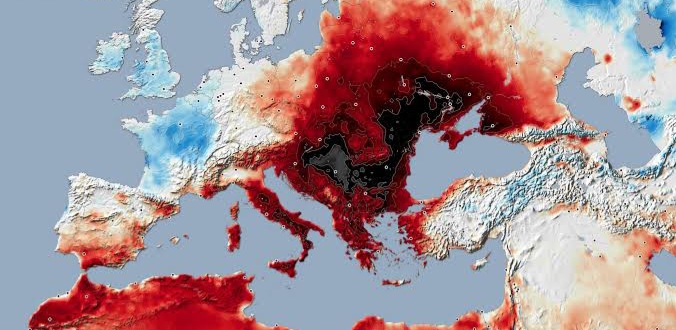Brussels, August 08, 2024, The Europe Today: July 2024 has been recorded as the second-hottest July in history, narrowly cooler than July 2023, according to a report released Thursday by the European Union’s climate monitor.
This July ended a 13-month streak of monthly temperature records.
“The streak of record-breaking months has come to an end, but only by a whisker,” said Samantha Burgess, deputy director of the Copernicus Climate Change Service (C3S). Burgess emphasized that the overall trend of global warming remains unchanged despite the broken streak. “The devastating effects of climate change started well before 2023 and will continue until global greenhouse gas emissions reach net zero,” she added.
What Does the Data Say?
The report revealed that July 2024 was 1.48 degrees Celsius (2.7 degrees Fahrenheit) above the pre-industrial reference period of 1850-1990. The past 12 months saw temperatures 1.64 C above the pre-industrial average due to climate change.
From January to July, global temperatures were 0.7 degrees Celsius above the 1991-2020 average, making it increasingly likely that 2024 will be the warmest year on record.
Regions experiencing above-average temperatures in July included southern and eastern parts of Europe, the western US, western Canada, most of Africa, the Middle East, Asia, and eastern Antarctica. Conversely, near or below-average temperatures were recorded in northwestern Europe, western Antarctica, parts of the United States, South America, and Australia.
No Relief Ahead
Scientists noted that air temperatures over the ocean remained unusually high even as the El Niño weather pattern transitioned to its opposite, La Niña, which typically has a cooling effect.
“This El Niño has ended, but the magnitude of global temperature rises remains similar to a year ago,” said Julien Nicolas, a climate researcher with Copernicus, to Reuters news agency. “We are not done with temperature records causing heatwaves. We know this long-term warming trend can be with a very high level of confidence related to the human impact on climate.”
Nicolas raised concerns about the broader implications on ocean currents, asking, “That raises the question of what is happening to the ocean outside this natural climate pattern like El Niño or La Niña events. Are there shifts in the ocean currents?”
As global temperatures continue to climb, the urgency for effective climate action becomes ever more critical.


